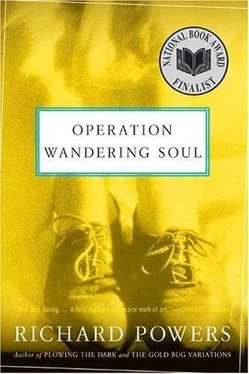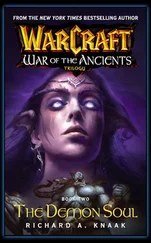Richard Powers - Operation Wandering Soul
Здесь есть возможность читать онлайн «Richard Powers - Operation Wandering Soul» весь текст электронной книги совершенно бесплатно (целиком полную версию без сокращений). В некоторых случаях можно слушать аудио, скачать через торрент в формате fb2 и присутствует краткое содержание. Год выпуска: 2002, Издательство: Harper Perennial, Жанр: Современная проза, на английском языке. Описание произведения, (предисловие) а так же отзывы посетителей доступны на портале библиотеки ЛибКат.
- Название:Operation Wandering Soul
- Автор:
- Издательство:Harper Perennial
- Жанр:
- Год:2002
- ISBN:нет данных
- Рейтинг книги:5 / 5. Голосов: 1
-
Избранное:Добавить в избранное
- Отзывы:
-
Ваша оценка:
- 100
- 1
- 2
- 3
- 4
- 5
Operation Wandering Soul: краткое содержание, описание и аннотация
Предлагаем к чтению аннотацию, описание, краткое содержание или предисловие (зависит от того, что написал сам автор книги «Operation Wandering Soul»). Если вы не нашли необходимую информацию о книге — напишите в комментариях, мы постараемся отыскать её.
Operation Wandering Soul — читать онлайн бесплатно полную книгу (весь текст) целиком
Ниже представлен текст книги, разбитый по страницам. Система сохранения места последней прочитанной страницы, позволяет с удобством читать онлайн бесплатно книгу «Operation Wandering Soul», без необходимости каждый раз заново искать на чём Вы остановились. Поставьте закладку, и сможете в любой момент перейти на страницу, на которой закончили чтение.
Интервал:
Закладка:
The cadre of adults, however, are universally frozen in place. Churchgoing, field-mowing, crockery-stowing, they hear nothing, least of all their young skipping clandestinely away to see who else in this world can possibly know the melody that has been plaguing their heads since — when? — last night, the life before, twenty-four centuries at my door. Every battered, conscripted day laborer, the devil nightly Wed out of him, every manhandled mug under the magical cutoff age, takes to this melody like a new soul to the amniotic bath.
The youngest of them follow it more clearly than they as yet follow speech. A tiny blond girl with bruises down the length of each tube-worm thigh begins to sing a descant. Another, perhaps twelve, her flesh harder, her father-inflicted running sores more secret and circumspect, starts to twirl a tempo . She sets off others, mad bodies spinning reckless Ptolemaic epicycles through a market that fills with children aligning to the sound like filings to lodestone's invisible rose.
The whole carnival consolidates in a subslice of time, in the moment between one frozen adult's footstep and the next. Children march into the square banging and blowing and beating on makeshift drums and fifes of their own devising. In those where music has been stillborn, strangled blue in the bloody birthing sheets, the cord of melody twisted around the infant neck, song now frantically rough-houses free in the open. Rhythms race the way little dead sibs do, making up for lost time on their one released night of the year.
Solo flute sparks a tremendous tagalong chorus counted out in rope skipping, beam swinging, seesawing, clacker clapping, acrobating: all the manic, oscillating metronomes of native idiom. Voices from all corners — calls and responses in the highest registers — take up the tune, improvise lyrics, lay down an obbligato above the piper's air:
How many miles must we go?
Hush, baby; play on. No one knows.
Will we make it there by candlelight?
Maybe one day; never tonight.
A boy who celebrated his seventh birthday underground, in salt passages no wider than his emaciated body, reverts to a game of fighting tops with a boy who last year had to kill his crazed father with a backhand bottle gash. Girl slaves kneel down to jackstones or rummy bones. Others gavotte about with tiny babies on their hips, real mothers playing with last year's dolls. A half-Mongol mongrel tribe ride imaginary hobbyhorses, battle on piggyback, cross stick weapons, everywhere singing. Some dress up in tablecloths and shawls. Others tug rope or tag or hide. The market erupts in celebration of every child's pastime yet devised, and several still waiting their invention. Each one is a step in a vast, improvised, composite dance.
Though fewer now, nose for nose, than at the piper's previous gig, the mammals filling the square for this reprise are more ecstatic and numinous. More certain. Their eyes, their hands, their open voices, their shared heart iambics are akeady transported. They know this song the way they knew to start breathing with the midwife's first abusive slap. Three sweet notes and the hope that has kept them alive is at last delivered. They are leaving at long last, today, now. This frozen instant. This time, there will be no delays. Wrapped in these supernatural pitches, subdividing them, pushing up against the vein of tone, inside the ambient candle globe of the sonic glow, the quickest, brightest children are already across to the other shore, the far face. Through. Over. Sky-blue.
On an alley cutting across the town's axis, the one band not yet tune-transformed makes its way agonizingly toward the square. The children of the house of desolation, confined just outside the city walls: no one has thought to alert them, and only the carrying power of summer air and the acuity of hearing when there is nothing to listen to tip them off. The plague house adults, too far from the sound to be frozen by it, do not bother to lift a hand against the exodus.
The band of sick ones clips along toward the market. The faster they rush, the farther the goal disappears in front of them. Their anxious skipping is disciplined, kept in check by the self-appointed child kapos in charge of this march. A boy of twelve, his injury not immediately visible, waves his arms in front of him like palm fronds, or those little national flags that liberators pass out to spruce up their reception.
"Faster," he whimpers. "Hur-ree! They'll leave any minute." His foot scuffs clumsily against a cobble, but he does not look down.
"Shut your face!" the oldest boy commands; actually, Hold your head, as they say in that time and region. He is older by too many years to be possible. Wrinkled, sagging with a disease that made his parents turn him out without provision. His head is unholdable, sleek, slippery, stripped of hair. He holds one hand on a blind boy's collarbone, roughly guiding him, and the other underneath the armpit of a girl whose leg has been taken off above the knee by a crescent of Romanesque iron. "We're going as fast as we can."
"I can go faster," the girl hisses. She tries to move her tree-stump crutch at cut time across the cobbles. But while she takes twice as many steps as before, they are only half as long.
"Easy," the bald boy says. "We'll make it." The panpipe and its pickup chorus carry in the air over their heads. The roll of that sung rhyme immobilizes them with desire, the need to melt the last mile with mere will. "We'll make it, or I’ll slaughter you all," he adds cheerfully. "They'll wait for us." He spits out a bit of tooth grit. "They gotta."
But the group's advance cadres already shear off. The band loses its front-runners to the melody. The lead invalids sprint marketward, laughing like imbeciles. All those unimpaired by their sickness are off, accelerating, casting a reluctant look back over a shoulder, shrugging, apologetic but vindicated.
"Hey, wait up. Stick together."
But the sound is too close now to hold out against. Its appeal, brook-clear and incomparably more refreshing, is greater than loyalty, debt, the bonds of the plague house. Betrayal is a crime in this world only. The notes they hear forgive everything.
Of the last, teetering stragglers, the girl is fiercest. She is first to return to walking's brutal pragmatics. Pushing herself forward painfully, she crinkles her nose in thought. "Will it be another town, there, do you think?"
Her features are dark, gracefully rounded, from nowhere near here. Her father was a Horseman. That explains her eyes and ear whorls, and perhaps even what God did to her leg, although His instrument was a fireplace andiron. "Will it be a city?"
The question falls on a dwindling gang of lag-behinds. Her human crutch, the boy with the tortoise-neck folds, picks it up. "Jesus. Who knows? Whatever you want. Who cares?'' He wants to shake her, kick her existing knee out from underneath her. "Can't you feel it yet?" You're getting your leg back there. Me, reprieve from freakhood. We'll all walk for our damn selves, from here on."
The cries of collective delight in the distance insist that they, all of them, will emigrate, today, to a place where they will not be tied down or caged, sent off to strangers, hung up in trees or exposed on the roadside to die, whipped naked in cellars for their parents' sins, shown corpses and executions as moral instruction, locked in closets for having nightmares, seared on their softest parts, groped out in sport, strangled for saying yes, put up as collateral for debt, traded, sold at seven, sentenced to life apprenticeship. The tune piping in the distance is deliverance from evil, the end of that torture, childhood.
"But nobody's going anywhere if we don't get a move on." The two that he hustles down the road exhale exasperated affection. The last delinquent band is down to a frayed thread, pulling itself on in urgency. The freak boy lifts the blind one and runs with him, carrying him like a root sack for several paces. The girl laughs and tries to crutch along quickly enough to catch them up.
Читать дальшеИнтервал:
Закладка:
Похожие книги на «Operation Wandering Soul»
Представляем Вашему вниманию похожие книги на «Operation Wandering Soul» списком для выбора. Мы отобрали схожую по названию и смыслу литературу в надежде предоставить читателям больше вариантов отыскать новые, интересные, ещё непрочитанные произведения.
Обсуждение, отзывы о книге «Operation Wandering Soul» и просто собственные мнения читателей. Оставьте ваши комментарии, напишите, что Вы думаете о произведении, его смысле или главных героях. Укажите что конкретно понравилось, а что нет, и почему Вы так считаете.












